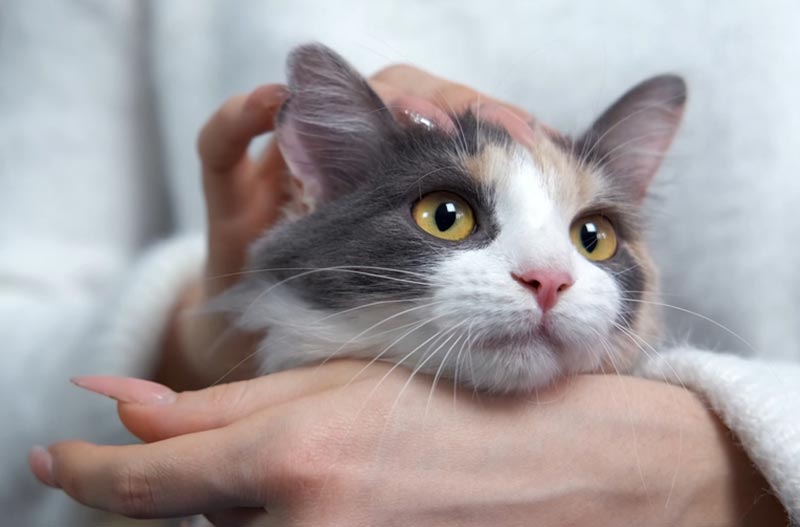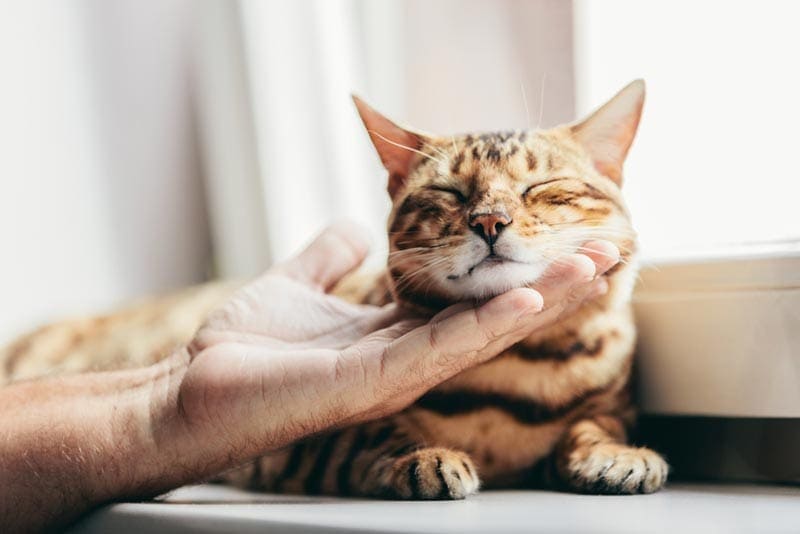
While scratching your cat’s head, you might listen for their quiet purr as a sign of contentment. The act of purring vibrates their larynx, so it’s normal for your cat to shake slightly while they purr. However, this shouldn’t be confused with involuntary trembling, which can signify health problems, anxiety, or trouble regulating temperature. As always, take your cat to the vet if you start to notice any recurrent or severe abnormal behaviors. Here are some reasons why your cat might shake while purring, and how to tell if it’s a problem or a sign of bliss.
The 7 Reasons Your Cat Might Shake While Purring
1. They’re Happy
If your cat’s body seems to “buzz” when they purr, they might be expressing contentment. This is more likely to be the case if they’re purring loudly, which will cause their bodies to vibrate more than usual. They might also raise their tails and quiver them excitedly, like they would if they’re urine marking.

2. They Can’t Regulate Their Body Temperature
This type of shaking is involuntarily. It usually involves intermittent shuddering instead of a soft and steady vibration. Your cat’s normal body temperature hovers between 101ºF and 102º F. If it’s out of range, your cat could be experiencing tremors from a fever or hypothermia. They also could simply be cold, which can be resolved by draping them in a blanket or holding them close to you.
3. They Feel Anxious or Afraid
Most cats have a limited tolerance for change. Anxiety frequently develops if their household has undergone a recent change such as shifting schedules, moving, or adopting another child or pet. Anxiety and fear can sometimes lead to shaking in cats, just like it can in humans. Your cat may be trying to redirect your attention to them, especially if they’re crying. By taking the time to sit and pet your cat, you’re putting them at ease enough to purr, but maybe not enough to make them completely comfortable, hence the shaking.

4. They’re Actually Dreaming
It is possible for your cat to purr while sleeping. Involuntary twitches may result from the REM stage, the most sensitive stage in the sleep cycle which is when most people and animals dream. They could be reacting from something they see in their dreams, or subconsciously responding to you stroking them.
5. They’re in Pain
If your cat has injured themselves, they could be shaking from pain. Although it sounds counterintuitive since cats usually purr from happiness, cats also purr when they’re hurting. Not only does purring soothe your cat, but there’s also limited evidence that the vibration frequency encourages bone regeneration! If you’re concerned, you can always look over their body to check for any signs of obvious discomfort.

6. They Have a Medical Condition
Hypoglycemia, or low blood sugar, is a common cause of shaking in cats, and could be a symptom of diabetes. If the shaking seems involuntarily and out of the ordinary, you might want to call your vet, especially if you’ve already ruled out the other possibilities.
7. They’re Done with You
Cats can shake to signify that the petting session is over and they’re ready to move on. They might also try to communicate this by standing up to stretch, thumping their tail on the ground, swatting at you, or giving you a playful little nibble.

How to Tell When Shaking Is a Serious Condition
If your cat shakes when they purr, or at any other time, it’s important to determine where the shaking is coming from and how widespread it is. Happy shaking while purring usually will usually be centralized around their larynx, although their entire body might experience a soft vibration. However, this is different from harsh tremors, which are more violent in nature, and are not necessarily normal.
Your cat might shake one region of their body while sleeping because they’re responding to a dream. However, if your cat is shaking intermittently, involuntarily, or violently while they’re awake, they might be suffering from an injury or medical condition such as hypoglycemia. You should take your cat to the vet if the condition continues without probable cause.
Conclusion
Shaking while purring isn’t necessarily anything to worry about. Purring naturally vibrates your cat’s body, which usually results in a soft “buzzing.” This is different from sudden shaking, such as experiencing a chill. Take in other details of your cat’s demeanor, including if they’re displaying signs of anxiety or discomfort such as yowling or aggressively swishing their tail. Reading their entire body language and noticing any other unusual behaviors can help you determine if your cat needs to go to the vet or is merely enjoying your company.
Featured Image Credit: AleksDaria, Shutterstock






